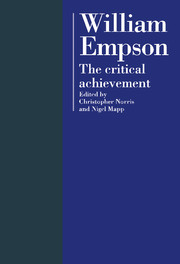Book contents
- Frontmatter
- Contents
- Contributors
- Foreword
- 1 Introduction: Empson as literary theorist: from Ambiguity to Complex Words and beyond
- 2 Empsonian honesty and the beginnings of individualism
- 3 Empson, Leavis, and the challenge of Milton
- 4 Empson's Satan: an ambiguous character of the seventh type
- 5 Compacted doctrines: Empson and the meanings of words
- 6 Figural narrative and plot construction: Empson on pastoral
- 7 More lurid figures: de Man reading Empson
- 8 Fool and pharmakon
- 9 William Empson's cosmicomics
- 10 Empson as teacher: the Sheffield years
- References
- Index
8 - Fool and pharmakon
Published online by Cambridge University Press: 01 June 2011
- Frontmatter
- Contents
- Contributors
- Foreword
- 1 Introduction: Empson as literary theorist: from Ambiguity to Complex Words and beyond
- 2 Empsonian honesty and the beginnings of individualism
- 3 Empson, Leavis, and the challenge of Milton
- 4 Empson's Satan: an ambiguous character of the seventh type
- 5 Compacted doctrines: Empson and the meanings of words
- 6 Figural narrative and plot construction: Empson on pastoral
- 7 More lurid figures: de Man reading Empson
- 8 Fool and pharmakon
- 9 William Empson's cosmicomics
- 10 Empson as teacher: the Sheffield years
- References
- Index
Summary
‘Ambiguity’, like ‘irony’, has so long been a common instrument of modern criticism that its use may well have sunk into the totally routinized. Yet its capacity to find new forms of defamiliarization, to resurface through other conceptual languages such as the ‘polysemy’ of Barthes or Derrida, may show the ease with which certain underlying preoccupations about the nature of language may be naturalized in conceptual schemes of different sorts, with wider implications of quite different kinds. It is the echo of this naturalization, and what it tells us about the theoretical structure that uses it, that may help measure the force of such theories themselves, show something of their degree of reach, and their illumination of the richness and congestion of meaning to which they address themselves. For the exploration of the possibilities and limits of the multiple senses of ‘complex words’ has seemed part of our understanding of language in general, but most especially of the language of literature where that complexity seems a constitutive principle. And in an adjacent form of discourse Derrida sees something equally constitutive in the ambiguity that arises through translation and marks what he calls ‘the very passage into philosophy’.
What happens when one tries to measure the passage by way of translation, with all of the multiple senses such a passage may contain - including the translation by which we express our understanding of a literary work - or the analogous path by which the exploration of the richness of language may be found in the cultural depth of a key word? If I am concerned here with two kinds of investigation, the analogy may have some use in giving intelligible dimensions to an enduring problem in critical thought.
- Type
- Chapter
- Information
- William EmpsonThe Critical Achievement, pp. 243 - 268Publisher: Cambridge University PressPrint publication year: 1993



